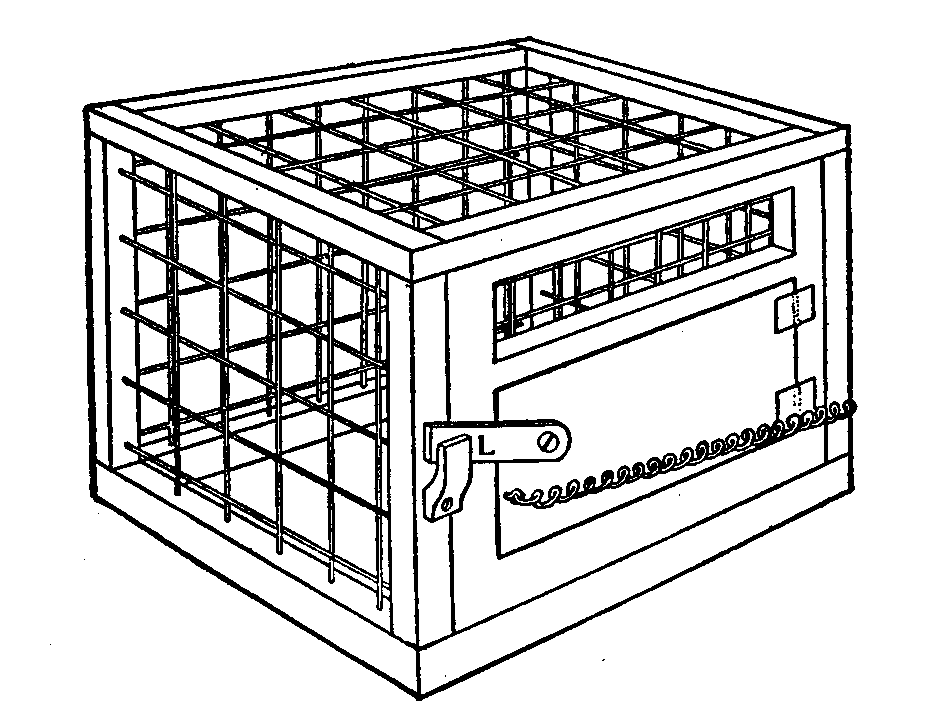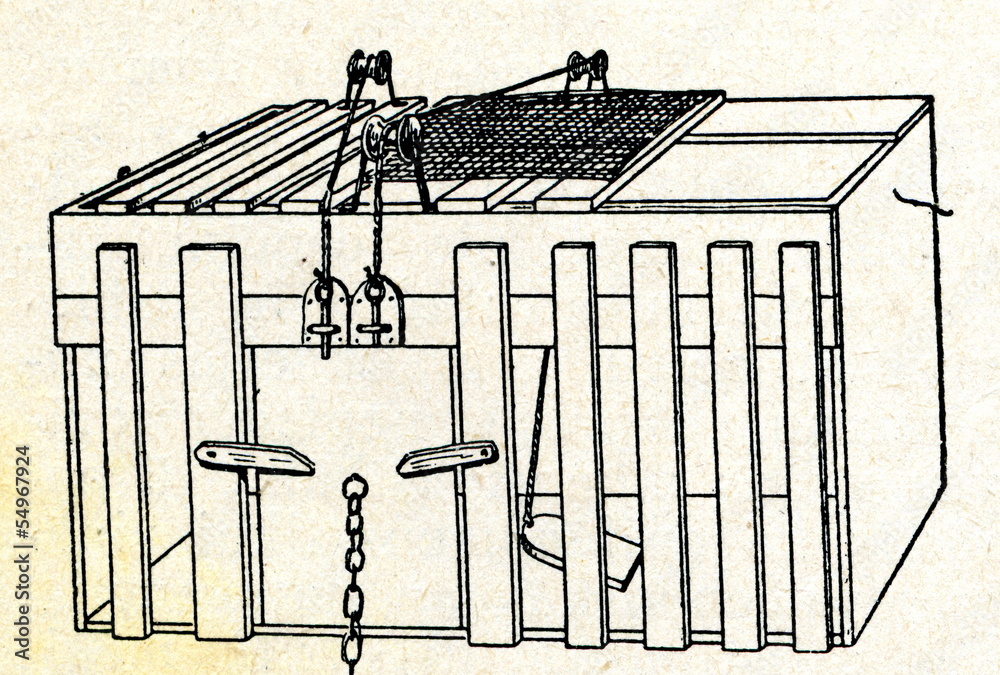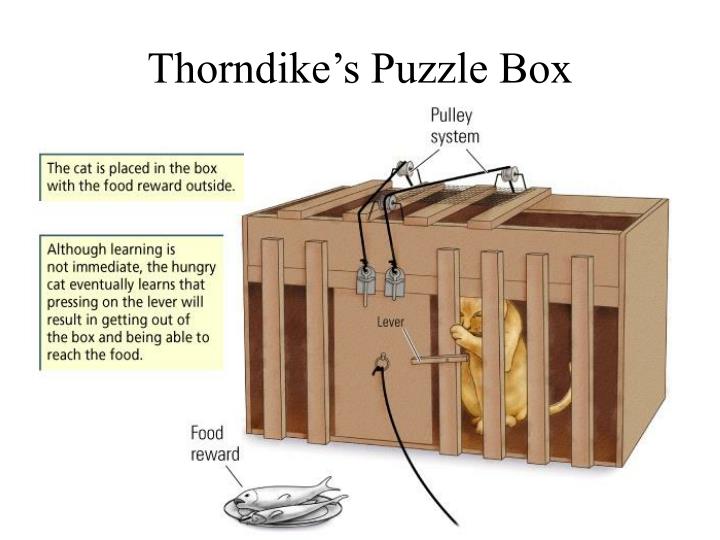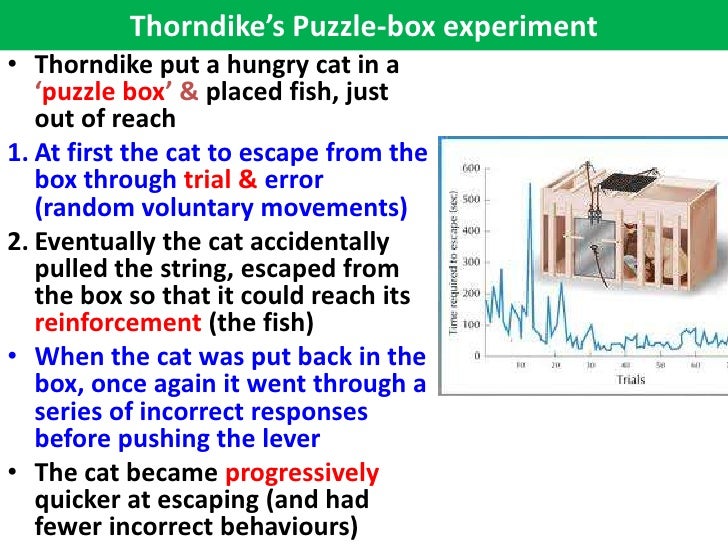
😊 Thorndike cat puzzle box. Terrierman's Daily Dose Thorndike's Cat
Introduction In 1898 " Animal Intelligence: An Experimental Study of the Associative Processes in Animals ." was published by Thorndike. (he was only 23.). although few credible researchers at that time criticized the experiences this paper made a huge impact in the field of psychology.

Watson, Pavlov, Thorndike, Skinner, and the Development of Behaviorism
Thorndike's discovery had a major influence on the development of behaviorism. In fact, B.F. Skinner based his theory of operant conditioning on the law of effect. Skinner even developed his own version of a puzzle box which he referred to as an operant conditioning chamber (also known as a Skinner box).

PPT Learning An Invitation to Psychology Second Edition Carole Wade
Introduction Thorndike developed a theory of learning through on the basis of this experimental research with animals. He represented the original Stimulus-Response (S-R) framework and considered that learning is the result of associations formed between stimuli and response.

Thorndike's puzzle box Stock Photo Adobe Stock
Thorndike's early puzzle box experiments and early animal work on cats, dogs, and chicks allowed him to empirically plot learning curves for what animals learned, how quickly the learning occurred, and how long the learning was retained. Results from these experiments led Thorndike to propose three primary laws that predicted behavioral.

A 'puzzle box' devised by Thorndike (1899, 2017) to study learning
Original puzzle box designed by Edward Thorndike. In 1898, American psychologist, Edward Thorndike proposed the 'law of effect', which formed the basis of operant conditioning. Thorndike conducted experiments to discover how cats learn new behaviors. His work involved monitoring cats as they attempted to escape from puzzle boxes.

Education (09) Learning and Motivation(Psychological
Lesson Transcript Author Heather Heunermund View bio Instructor Wind Goodfriend View bio Learn about Thorndike's Law of Effect. Read about Thorndike's use of puzzle boxes and cats to.

Operant Conditioning Keith E Rice's Integrated SocioPsychology Blog
Puzzle box (Thorndike) Geert Stienissen 2.7K subscribers Subscribe Subscribed 2.6K 495K views 13 years ago The puzzle box is the laboratory device that Edward L. Thorndike invented in.

PPT Operant Conditioning PowerPoint Presentation ID1608611
Edward Thorndike (1898) is famous in psychology for his work on learning theory that leads to the development of operant conditioning within b ehaviorism. Whereas classical conditioning depends on developing associations between events, operant conditioning involves learning from the consequences of our behavior.

PPT Thorndike’s puzzle box Skinner box The card flipping task
Thorndike's Puzzle Box E.L. Thorndike used his puzzle box to measure how fast a cat could find its way out of an enclosure to reach a bowl of food. In any type of scientific experiment, the.

Trial & error learning Thorndike VCE U4 Psych
Thorndike's Puzzle Boxes And The Origins Of The Experimental Analysis Of Behavior. Thorndike's Puzzle Boxes And The Origins Of The Experimental Analysis Of Behavior J Exp Anal Behav. 1999 Nov;72(3):433-40. doi: 10.1901/jeab.1999.72-433. Author P Chance. PMID: 16812921.

😊 Thorndike cat puzzle box. Edward Lee Thorndike Theory of Learning
Erie County man creates the Puzzle Barn to help people pass the time. By Breanna Fuss Boston. PUBLISHED 7:20 AM ET Dec. 08, 2021. BOSTON, N.Y. — At one point during the pandemic, there was a global shortage of puzzles. With stay-at-home orders, people gravitated toward the oddly-shaped, yet colorful pieces of cardboard, wood, whatever they.

Thorndike Puzzle box experiment YouTube
Thorndike's puzzle box experiments provided the first systematic empirical investigation of instrumental conditioning and served to establish instrumental conditioning as one of the basic paradigms for the study of learning and behavior analysis (Chance 1999). Some have referred to the basic finding that behavior is increased by a positive or.

[Get 25+] Puzzle Box Experiment Thorndike
Edward Thorndike's (1898) work with cats and puzzle boxes illustrates the concept of conditioning. The puzzle boxes were approximately 50 cm long, 38 cm wide, and 30 cm tall (see figure below).

Thorndike's puzzle box. Nerdy jokes, Chemistry cat, Chemistry humor
Thorndike's Puzzle Boxes And The Origins Of The Experimental Analysis Of Behavior. P. Chance Published in Journal of The Experimental… 1 November 1999 Psychology TLDR

Thorndike puzzle box stepindance.fr
In the case of the cats in Thorndike's puzzle box, each had difficulty escaping at first, but each eventually stumbled on the secret of opening the box. On succeeding trials the animal escaped faster and faster, with performance leveling off after the animal learned to escape as quickly as it could.

Thorndike Puzzle Box Experiment YouTube
Other articles where Thorndike puzzle box is discussed: animal learning: Classical and instrumental conditioning:.placing a cat inside a "puzzle box," an apparatus from which the animal could escape and obtain food only by pressing a panel, opening a catch, or pulling on a loop of string.